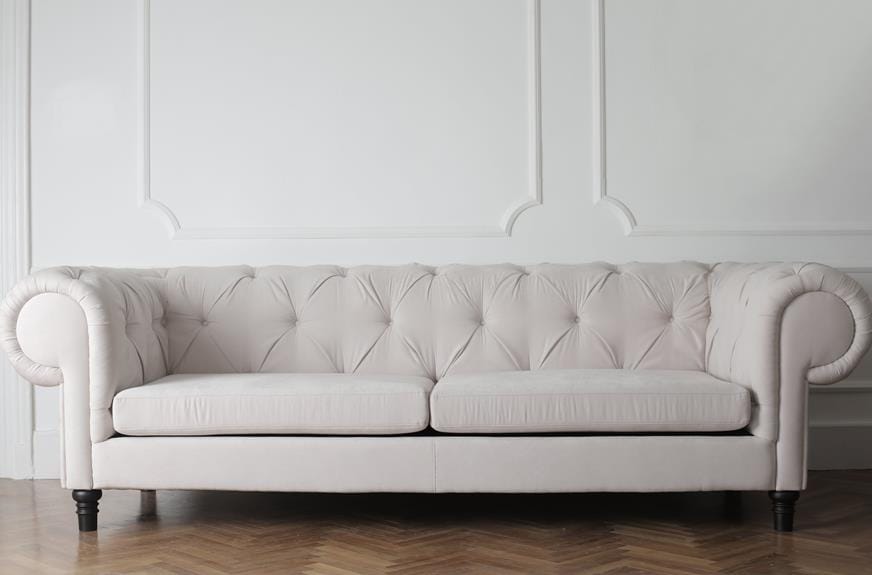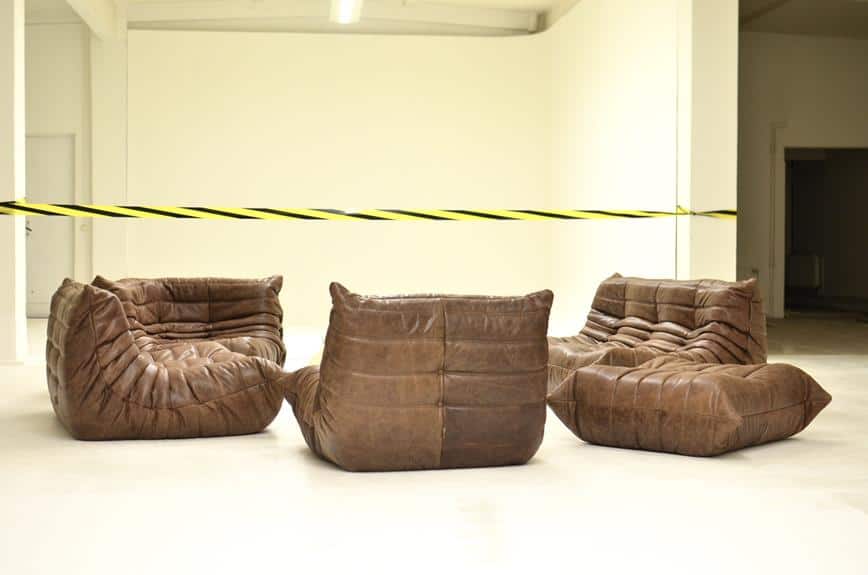The best foam density for a couch ranges from 1.8 to 2.5 pounds per cubic foot, providing a good mix of comfort and support. Foams with a density above 2.5 pounds are more durable and firmer.
When choosing a couch, consider how it will be used, your comfort preference, and your budget. The right foam density contributes to the couch's comfort, functionality, and longevity.
Understanding Foam Density
Foam density is a measure used to evaluate the quality of couch cushions, indicating their weight per cubic foot in pounds (PCF). A higher density, typically between 1.8 to 2.5 PCF, indicates better quality, as it suggests increased durability and support. High-Density (HD) foam in this range is more resistant to wear and suitable for frequently used furniture. Foam with density lower than this range tends to deteriorate faster, leading to sagging cushions that affect both comfort and appearance.
Different foam densities are available to meet various needs; higher densities usually mean longer-lasting foam but can also feel firmer. It is important to balance foam density and firmness to achieve the desired comfort level. Higher density foam maintains its shape under regular use.
Ideal Density for Comfort
The ideal foam density for a comfortable couch typically ranges from 1.8 to 2.5 pounds per cubic foot (PCF). This density provides a good balance of softness and support and is durable for everyday use. Higher density foam, above 2.5 PCF, offers a firmer seat, better support, and resistance to sagging, which can enhance the lifespan of the couch. Lower density foam may feel softer initially but can lose shape and resilience faster, leading to a shorter life for the sofa.
High Resiliency (HR) foam, often with a density exceeding 2.5 PCF, is recommended for those prioritizing durability and comfort. HR foam combines softness with firmness and retains its shape well, making it a long-lasting option.
Foam Density and Durability
Foam density is crucial for the longevity and shape retention of couch cushions. High-density foam, typically within the range of 1.8 to 2.5 pounds per cubic foot, provides better support and is less likely to deform over time compared to lower-density foam.
This means that high-density foam cushions can withstand daily use without losing their shape, offering both immediate comfort and long-term durability. The construction of the cushions, with a high-density foam core, is important as it prevents sagging and ensures the couch remains comfortable and maintains its structural integrity for a longer period.
Choosing a couch with high-density foam helps avoid frequent replacements that might be necessary with lower-density options.
Types of Foam Materials
In upholstery, different foam materials such as polyurethane, memory foam, and high-resilience foam cater to varying levels of density and comfort for furniture. Each foam has distinct characteristics that affect a couch's performance and durability.
Polyurethane (PU) foam is widely used for its adaptability, available in soft to extra firm densities to accommodate various comfort levels. It is affordable but varies in quality; high-density PU foam is preferable for frequently used couches.
Memory foam molds to the body, providing pressure relief. It is often used as a top layer with a firmer foam base in couches, as it can be overly soft by itself.
High Resilience (HR) foam is designed for both durability and comfort, with higher density and resilience than standard foams. It is suited for heavily used furniture and usually combines a firm core with softer layers for support and comfort.
Sometimes, Dacron polyester fiber wraps around cushions to add softness while maintaining the foam core's firmness. Choosing the correct foam material is essential for a couch's comfort and longevity.
Comparing Density and Firmness
Density and firmness are key attributes to consider when choosing foam for a couch. Density, measured in pounds per cubic foot (PCF), indicates the foam's compactness. High-density foam, often labeled as HR (High Resilience), typically offers greater durability and retains its shape better with regular use.
Firmness measures the foam's feel and is determined by its indentation force deflection (IFD) rating. It is important to understand that firmness levels can vary within high-density foams, and this measure does not necessarily reflect the foam's quality.
For a sofa that balances comfort and durability, select high-quality, high-density foam matched with a firmness that suits personal comfort preferences. High-density foams maintain the shape and support of the sofa over time, while the chosen firmness level provides immediate user comfort.
High resilience (HR) foams are recommended for frequently used furniture due to their superior ability to bounce back after use.
Foam Density in Couch Selection
Choosing the right foam density for a couch is important for ensuring comfort and durability. Foam density indicates the amount of material per volume and is measured in pounds per cubic foot (PCF). A higher density foam means more material and less air, which makes the couch more resistant to daily wear and tear.
Couches with higher foam density provide better support and lessen pressure points, improving comfort. High-density foam also retains its shape longer, keeping the couch comfortable over time. As foam deteriorates, it may need replacement, and choosing higher density foam will extend its lifespan.
For home furniture, foam densities between 1.8 and 2.5 PCF are considered high-quality, with High Resilience (HR) foam being preferred due to its density and resilience. When buying a sofa, the foam density should be considered to ensure the furniture will be durable and comfortable, particularly if it will be used often.
Maintaining Your Couch's Foam
Maintaining couch foam is important for its support, comfort, and life span. Choose a high-density foam like HR foam for better durability. To keep its quality, regularly care for the foam.
A foam density of 1.8 to 2.5 pounds per cubic foot is ideal for couch cushions. Without maintenance, even high-quality foam will wear down. Regularly flip and rotate cushions to distribute wear and avoid sagging.
If cushion covers are removable, clean them often to prevent dust and spills from reaching the foam. This keeps the foam in good condition and extends its life.
Keep couch cushions away from too much heat and direct sunlight to prevent foam degradation. Following these maintenance steps will prolong the foam's durability, keeping the couch comfortable and supportive for a longer time.





